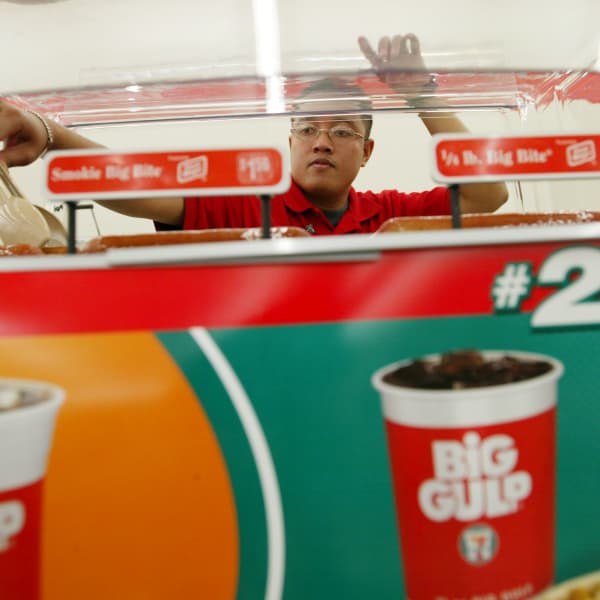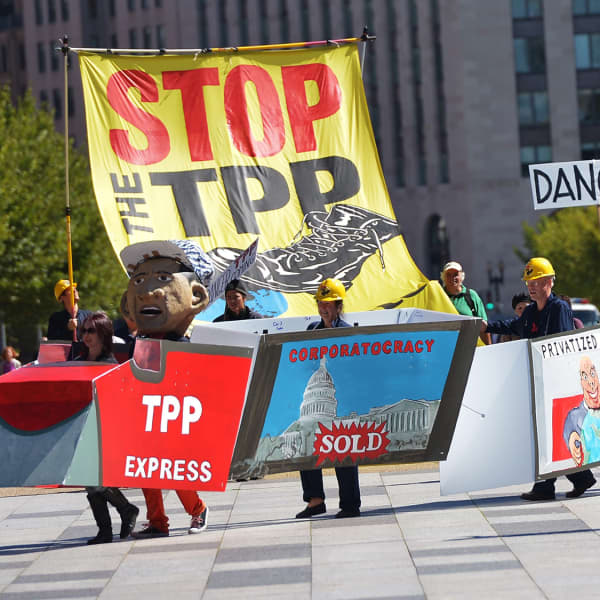Famed franchises and financial failure
The franchise model has been a major player in the success story of modern American consumer capitalism, and can be summed up in one word: McDonald's.
Make no mistake, however. While popular as an investment opportunity with entrepreneurs, franchises face all the typical market pressures associated with large, publicly-traded corporations (which many franchise parent firms are). These pitfalls include fads turning on a dime after a period of rapid over-expansion; market saturation with everyone chasing the last great idea when it's too late; a consumer class shifting in preferences; and disruptive models that don't get identified until it's too late.
Consider Radio Shack, which now faces a serious financial crisis. It's easy to forget that just a few decades ago it was a pioneer of consumer technology at the dawn of the gadget era.
Some high-profile franchises have traveled from fast track IPO to bankruptcy court —and the timeline between both is much shorter than you'd expect. Still, some have rebounded and made an astounding business comeback. Either way, financial fragility is a serious issue for entrepreneurs considering business opportunities.
Read ahead to see how 10 famous U.S. franchises faced serious challenges and in some cases, even extinction. Yet they did manage a comeback, to varying degrees of success, and some as part of still-evolving turnaround stories.
—By Nicholas Duva, Special to CNBC.com
Posted Sat. Nov. 1, 2014
Krispy Kreme
Remember the days before diminutive, designer (overpriced) cupcakes, when people just wanted good old American donuts? When Krispy Kreme went public in 2000, there didn't seem to be a hole in its financial model. It wasn't long before investors were dazed, and the financial reporting for the company seemed a tad too glazed.
Its 2000 initial public offering was followed by a stratospheric stock surge, from under $10 to near $50 in its first four years. That was swiftly followed by unexpected losses and a Securities and Exchange Commission investigation into accounting irregularities. Not even to mention the anti-carbohydrate diet craze.
Read MoreMom-and-pop shops: Four myths
But like its product's shape, the Winston-Salem, North Carolina company founded in 1937 came full circle. Since its shares hit a low just above $1 in 2009, its stock price had increased roughly 450 percent in the past five years to $18.57 through Oct. 30. Krispy Kreme now also has 500 international locations.
Mrs. Fields Cookies
Debbi Fields, a homemaker with no business experience, opened her first cookie store in Palo Alto, California in 1977, which ultimately led to a franchising model in 1990. "The important thing is not being afraid to take a chance. Remember, the greatest failure is to not try," Fields says on the company's website. And Mrs. Fields has certainly taken a bite out of both success and failure along the way.
In 2008, Mrs. Fields Brands, the parent to the cookie company and TCBY frozen yogurt, filed for bankruptcy. The mall market was hurt by the U.S. financial crisis that threatened the entire global economy, and frozen yogurt had become a very crowded space. The company almost went bankrupt again in 2011, when it was restructured by private equity firms like Carlyle Group and Z Capital Partners.
Read MoreBanks that want to give business loans
The company is now called Famous Brands and is owned by Z Capital Partners (which bought out Carlyle's minority stake), but is still working on its dual rebound. TCBY has closed almost 1,500 stores since 2011, down to about 650 stores, while Mrs. Fields has closed 60 percent of its stores since 1993, with 400 locations globally. The new recipe for growth is dual-branded stores, and there have been some signs of a revival.
Sbarro Pizza
Mrs. Fields is not the only food franchise that private equity has been hungry to acquire. Founded by Italian immigrants Gennaro and Carmela Sbarro in Brooklyn in 1956, Sbarro Pizza filed for bankruptcy in early 2014 (its second bankruptcy in the past three years).
In February, the company announced plans to close 155 of the 400 restaurants it owned in North America. Overall, it has around 800 restaurants and about 600 franchised locations. But it was a short trip to bankruptcy. Sbarro exited only three months later when it was acquired by a private equity consortium in June.
The company's latest strategy and change of location makes sense to anyone who has been watching the latest craze in the franchise, and restaurant space: fast casual dining. The company is betting on its new fast casual pizza concept, started in the Ohio market, where the company is now headquartered.
Quiznos
New York expat Jimmy Lambatos founded Quiznos in Denver in 1981, seeking to recreate the kind of toasted sandwich he could easily find back home.
Over the next quarter-century, the idea caught on, and the Subway competitor's locations exploded to over 4,600 stores. In 2007, however, it promptly reversed course, closing thousands of restaurants worldwide. The changes were not enough to keep the chain from declaring Chapter 11 bankruptcy earlier this year.
Bankruptcy, though, wasn't enough to deter Quiznos. It emerged from bankruptcy in July, and is now expanding internationally: it plans to open over 1,000 locations in China, Indonesia, and Malaysia, among other places.
Friendly's
Friendly's was founded in the middle of the Great Depression—an ominous sign, perhaps, or a symbol of how resilient a franchise could become—by brothers Prestley and Curtis Blake in Springfield, Massachusetts.
The chain, more famous for its ice cream than meals, floundered during the Great Recession and declared Chapter 11 bankruptcy in October 2011, closing a host of stores in the process. Though as in the case of many other franchises, it relatively quickly emerged from bankruptcy, in January 2012.
Franchises continue to operate and even open across the East Coast: Friendly's website claims that the chain is trying to expand to new markets, including Georgia, North Carolina, and West Virginia. But the trends that drove it to bankruptcy in the first place—consumers' growing distaste for casual, full-service restaurants—are a challenge.
Blockbuster
The formerly ubiquitous movie rental chain went through a long-expected bankruptcy in September 2010, attributed most often to the growth of online streaming and DVD delivery services by companies like Netflix. After being bought by satellite company Dish Network, the chain finally began closing all corporate stores in November 2013, setting off a rash of liquidation sales (read: DVDs for 99 cents each).
A less known fact, however, is that a smattering of franchise Blockbuster stores remain open throughout the country. Some stores in Texas stay alive by keeping margins low, renting movies for as little as 49 cents a day, or 99 cents a week.
Bally Total Fitness
After Jack LaLanne pulled cars and boats with a chain hooked up to his 'He-Man's' chest, the mainstreaming of fitness attracted numerous entrepreneurs. It still does today, with chains like Planet Fitness, Crunch and Equinox.
Bally's Total Fitness, one of the older fitness club chains and founded in 1983, has had its share of controversies. In particular, one centering on membership cancellation practices led to a high-profile investigation by the New York State Attorney General. It was also investigated and charged for larger-scale financial fraud by the Securities and Exchange Commission (SEC).
Still, Bally's 2007 and 2008 bankruptcies—occurring within a span of 14 months—can primarily be attributed to factors that commonly take down franchises. The chain had over-expanded, rising to over as many as 349 clubs (171 of which it sold to competitor LA Fitness in 2009), and had over-expanded into a crowded market. However, Bally's gym locations remain open today in states including California, Colorado and New York.
Bennigan's
In January of last year, Bennigan's made a splash when the Irish-themed chain announced it was opening its first restaurant in Dubai.
That stood in stark contrast to July 29, 2008, when all 150 domestic corporate-owned restaurants unexpectedly and suddenly closed. Bennigan's (and its sister chain Steak and Ale) had filed for Chapter 7 bankruptcy, which requires the filer to cease all operations and liquidate assets.
Franchisees, however, were free to keep their stores open—there were roughly 160 domestic and international franchised locations at the time of the 2008 bankruptcy, many of which did go down with the parent brand. Atalaya Capital Management purchased Bennigan's assets in October 2008, and since then has focused on keeping franchise locations open and expanding internationally.
Today, there are more Bennigan's abroad than in the U.S.
Chevy's Fresh Mex
Sensing a trend in some franchise hard times? Yes, the casual restaurant sector has been a risky one, even as the newer fast-casual eating chains, led by Chipotle Mexican Grill, are finding success.
Chevy's never dominated the casual food market, but it was one of the biggest Mexican casual food chains in the country. Particularly loved were its happy hour specials, especially its $3, sugar-laden Margaritas.
It was bought in 2005 by Real Mex Restaurants, and soon expanded to around 100 stores.That number is down to 25 franchised stores today, due to Real Mex's 2011 Chapter 11 bankruptcy that closed almost all corporate locations.
The Tex-Mex restaurant emerged from bankruptcy in 2012. The flagship location still has a role to play in the country's biggest New Year's Eve party in Times Square. That location introduces tourists from around the world to its calorie-busting Margarita concoction. And, yes, it still has daily $3 drink specials (a real bargain for travelers thinking in euros or other countries).
Chevy's has also, not surprisingly, pivoting to a strategy that is closer to the Chipotle, fast-turnaround model.
Perkins Restaurant & Bakery
Casual chains haven't fared so well throughout recent franchise history. But Americans not eating a steady diet of pancakes? Impossible!
Sadly, its all too true. It seems as if lumberjacks aren't employed in as great numbers as they used to be, and the "lumberjack" diet of the average American hasn't really recovered fully from the recession, either.
If you were grabbing breakfast in 2006 at a national sit-down chain, and that chain wasn't called IHOP or Denny's, there was a good chance you were eating at Perkins.
Famous for its in-house bakeries, and founded in 1958 as a pancake house in Ohio, Perkins filed for Chapter 11 bankruptcy in June 2011. The chain emerged from bankruptcy later that same year.
There are still plenty of franchisees operating today—over 400 in the U.S. and Canada combined. Before the bankruptcy, the chain had roughly 600 locations.




